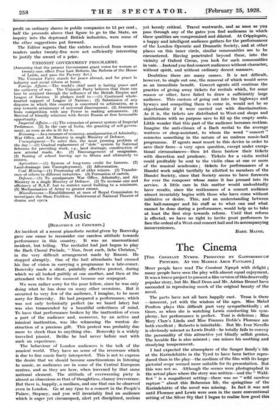Music
[BEHAVIOUR AT CONCERTS.]
AN incident at a recent pianoforte recital given by Borovsky gave one cause to reconsider our careless attitude towards performance in this country. It was an unsensational incident, but telling. The recitalist had just begun to play the Bach Choral Prelude, " Nun, freut euch, liebe Christen," in the very difficult arrangement made by Busoni. He stopped abruptly. One of the hall attendants had crossed his line of vision in carrying a programme to a late-comer. Borovsky made a silent, painfully effective protest, during which we all looked guiltily at one another, and then at the attendant who for the moment became our scapegoat.
We were rather sorry for the poor fellow, since he was only doing what he has done on many other occasions. But it occurred to very few of the audience, I imagine, to be more sorry for Borovsky. He had prepared a performance, which was not only technically perfect (as we heard later) but was also transcended by a beautiful orderliness of mind. To have that performance broken by the inattention of even a part of the audience and, moreover, by an active and inimical inattention, was like witnessing the wanton de- struction of a precious gift. This protest was probably due more to shock than to anything else. Borovsky is a widely travelled pianist. Belike he had never before met with such an experience.
The behaviour of London audiences is the talk of the musical world. They have no sense of the reverence which is due to fine music finely interpreted. This is not to express the desire that we should become sanctimonious in listening to music, as audiences are in some of the Central European centres, and as they are here, when leavened by that same national element. The attitude of overweening piety is almost as obnoxious as that of thoughtless, clumsy irreverence. But there is, happily, a medium, and one that can be observed even in London. Go at any time to a concert in the People's Palace, Stepney, and you will invariably find an audience which is eager yet circumspect, alert yet disciplined, zealous yet keenly critical. Travel westwards, and as soon as you pass through any of the gates you find audiences in which these qualities are compromised and diluted. At Cripplegate, a happy and intelligent audience gathers for the performances of the London Operatic and Dramatic Society, and at other places on this inner circle, similar communities are to be encountered. Having penetrated beyond these, into the vicinity of Oxford Circus, you look for such communities in vain. - Instead you find concert audiences without character, without spirit, and without ordinary decent manners.
Doubtless there are many causes. It is not difficult, however, to single out one, the removal of which would serve as an immediate benefit. Concert agents still continue the practice of giving away tickets for recitals which, for some reason or other, have failed to draw a sufficiently large audience. This custom of going out into the highways and byways and compelling them to come in, would not be so objectionable if it were carried out with discrimination. As it is, the tickets are distributed to West-end shops and institutions with no purpose save to fill up the empty seats. Little wonder that this part of the audience becomes restless. Imagine the anti-climax of a Bach recital to the average waitress or shop-assistant, to whom the word " concert " connotes something in the nature of an undress music-ball programme. If agents must resort to this device in order to save their faces—a very open question, except under excep- tional circumstances—then let them bestow their tickets with discretion and prudence. Tickets for a violin recital could profitably be sent to the violin class at one or more of the musical academies ; tickets for performances of a Handel work might tactfully be allotted to members of the Handel Society, since that Society seems to have forsworn for ever the composer whose name it has pressed into its service. A little care in this matter would undoubtedly have results, since the restlessness of a concert audience almost invariably begins with those who have come without initiative or desire. This, and an understanding between the hall-manager and his staff as to what can and what cannot be done during a performance, would help us to take at least the first step towards reform. Until that reform is effected, we have no right to invite great performers to face the ordeal of a West-end concert hall and its accompanying inconveniences.
Ram MAINE.








































 Previous page
Previous page